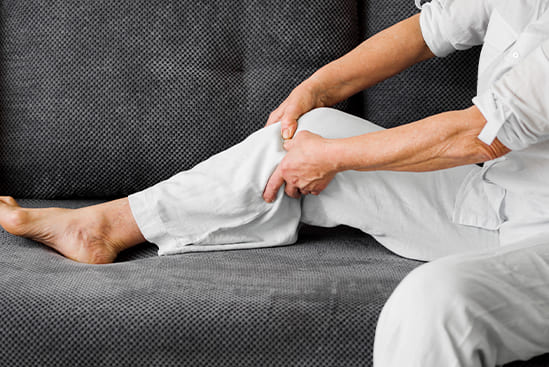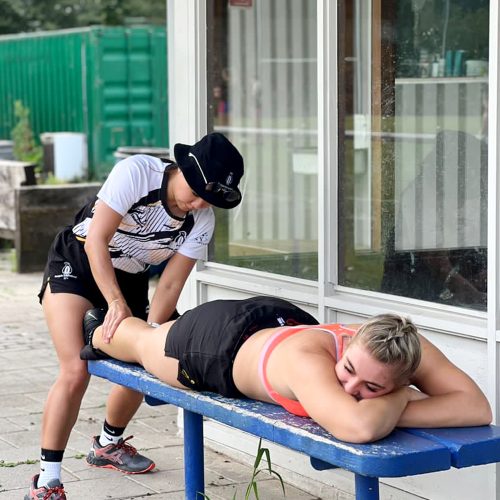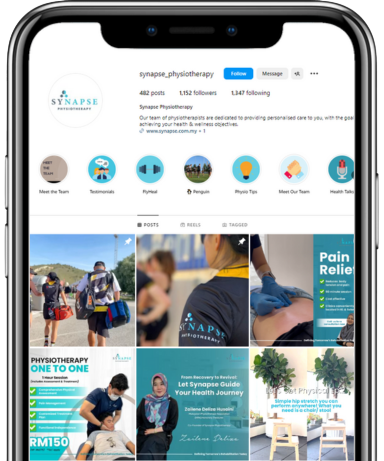

In the heart of Bukit Damansara, Kuala Lumpur, a beacon of excellence in physiotherapy stands tall – Synapse Physiotherapy Centre. We are more than just a healthcare facility; we are a team of dedicated professionals committed to empowering our patients to live life to the fullest. With a comprehensive range of services, including physiotherapy and rehabilitation treatments for musculoskeletal pain, sports injuries, neurological conditions, overuse injuries, arthritis, post-operation rehab, and geriatric rehabilitation, Synapse Physiotherapy is your partner in your journey towards optimal health and mobility.
Our Services:
1. Musculoskeletal Pain and Sports Injuries
At Synapse Physiotherapy, we understand the impact that musculoskeletal pain and sports injuries can have on your daily life and athletic pursuits. Our highly skilled physiotherapists assess and treat a variety of conditions, including sprains, strains, muscle tears, and joint injuries. By utilizing evidence-based techniques, we design personalized rehabilitation plans to expedite recovery and restore full functionality, enabling you to return to your active lifestyle stronger and safer.
2. Neurological Conditions
Neurological challenges, such as stroke, can be life-altering for individuals and their families. Our specialized neurological rehabilitation program focuses on enhancing motor function, balance, coordination, and independence. Our therapists leverage the brain’s neuroplasticity to maximize recovery and help you regain control over your life. With patience and dedication, we work alongside you in your rehabilitation journey, providing support every step of the way.
3. Overuse Injuries
Overuse injuries, like carpal tunnel syndrome and tendonitis, can hinder your ability to perform routine tasks. Our expert therapists excel in diagnosing and treating these conditions, employing a combination of manual therapy, therapeutic exercises, and ergonomic education to manage pain and promote healing. Our goal is to help you overcome overuse injuries and prevent recurrence, ensuring a pain-free future.
4. Arthritis Management
Living with arthritis can be challenging, but our team at Synapse Physiotherapy is here to ease your discomfort and improve your quality of life. Through gentle exercises, joint mobilization, and pain management techniques, we strive to reduce inflammation, increase joint flexibility, and enhance your ability to perform daily activities without hindrance.
5. Post-Operation Rehabilitation
After surgery, a comprehensive and well-structured rehabilitation plan is essential for a smooth recovery. Our post-operation rehab programs are tailored to your specific needs, promoting healing and preventing complications. With close collaboration with surgeons and a focus on evidence-based practices, we guide you through the recovery process, ensuring you regain strength and function efficiently.
Beyond Standard Services: Our Specialized Programs
1. Strength and Conditioning Programme
For athletes and fitness enthusiasts seeking to optimize performance and prevent injuries, our Strength and Conditioning Programme offers a tailored approach. Under the guidance of experienced professionals, you’ll enhance your strength, agility, and flexibility, unlocking your true potential and achieving new heights in your chosen pursuit.
2. Silver Fitness Programme
We believe in cherishing the elderly and promoting their health and independence. Our Silver Fitness Programme offers customized exercise routines and activities to suit the unique needs and abilities of older adults. By focusing on cardiovascular health, flexibility, and muscle strength, we enhance physical fitness while fostering social interaction and emotional well-being.
3. Radial Shockwave Therapy (RSWT)
As pioneers in innovative therapeutic techniques, we offer Radial Shockwave Therapy (RSWT) for various conditions, such as chronic musculoskeletal pain and tendinopathies. RSWT utilizes high-energy shockwaves to promote tissue healing and pain relief, offering an advanced solution for stubborn and persistent injuries.
Why Choose Synapse Physiotherapy?
At Synapse Physiotherapy, we take immense pride in our exceptional team of physiotherapists who are well-trained and hold qualifications from recognized institutions both locally and internationally. Each member of our team is fully registered with the Malaysian Physiotherapy Association (MPA), assuring you of their expertise and commitment to the highest standards of practice.
Patient-centered care lies at the core of our values, and this is reflected in our one-on-one, personalized, goal-oriented, focused, and targeted treatment sessions. We prioritize understanding your unique needs and work with you to achieve your specific rehabilitation goals, ensuring your journey to recovery is as smooth as possible.
In recognition of our commitment to excellence and professionalism, Synapse Physiotherapy is recognized by major insurance companies. This allows us to offer hassle-free billing and claims processing, making your experience with us as convenient as it is beneficial.
Contact us:
Located at No. 69-M, Jalan Setiabakti, Bukit Damansara, Kuala Lumpur, Synapse Physiotherapy is the destination for those seeking compassionate and expert care for a range of physical challenges. With a diverse range of services, specialized programs, and a patient-centered approach, we stand ready to empower you on your path to optimal health and mobility. For inquiries or appointments, contact us at +603-20115779 or email us at enquiry.damansara@synapse.com.my. Embrace the journey to a pain-free and fulfilling life with Synapse Physiotherapy.

Back & Neck Pain
- Spine & Core Rehabilitation
- Strength & Conditioning Programme
- Pain Management
- Biomechanical Assessment
- Sports Physiotherapy
- Group Class

Sports Injuries
- Strength & Conditioning Programme
- Pain Management
- Biomechanical Assessment
- Sports Physiotherapy
- Shockwave Therapy
- Group Class

Work Desk Injuries

Pre-Post-Surgical Conditions

Scoliosis & Postural Abnormalities

Neurological Conditions

Osteoarthritis & Rheumatism
Joint degeneration and inflammation happens as the human body grows older, but that does not mean our way of life degenerates as well. Relief your joint pains with a joint effort together with your physiotherapist, who will provide pain-relief treatments and prescribe exercises for your wellbeing.

Conditions Relating To Elderly
Common conditions in the older age population include hips & knee pain, back & neck pain, osteoarthritis, rheumatism, fear of falling and many more. Aging and degeneration of bodily function is inevitable, but here at Synapse, we will help you live the best of your life.









